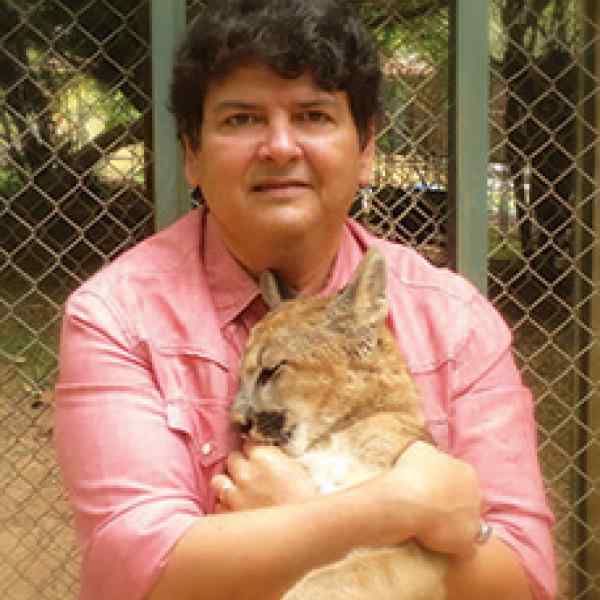Introdução
Dener Giovanini has designed a citizen-based network to fight the third largest illegal business in the world, animal trafficking. He incorporates Internet communications into a start-to-finish system that saves animals' lives, brings criminals to justice, and provides new employment opportunities to rural traffickers.
A nova ideia
Dener Giovanini has created the National Network Combatting Wild Animal Trafficking (A Rede Nacional de Combate ao Tráfico de Animais Silvestres), or RENCTAS, to curb and ultimately stop animal trafficking in Brazil by addressing the problem at all levels and including all relevant actors. Perhaps the most distinctive aspects of Dener's work are the focus on training programs for those low-income individuals who make a living by producing the animals for the phenomenally lucrative trade, and the degree to which he creates partnerships among people who would not ordinarily be in contact with each other. To that end, RENCTAS effectively links individuals and organizations to solve all aspects of the problem together: animal protection groups and veterinarians are linked to government officials who have seized the animals from the traffickers; individuals and organizations who want to report trafficking are linked to the government's environmental agency and the Public Prosecutor's Department. Dener's comprehensive approach includes: 1) an urgent response and care system for the animals who are seized by government officials; 2) training programs to provide alternative employment to those involved in animal trafficking; 3) a reporting system for those who want to report instances of trafficking; 4) training of police officers and customs agents in how to deal with animals that are seized; 5) efforts to improve and enforce environmental laws to provide greater protection for animals vulnerable to trafficking; and 6) a campaign to educate the public about the damage animal trafficking will cause to the environment, and to raise awareness among consumers in an effort to eliminate the market for trafficked animals.
O problema
According to the World Wildlife Fund, wild animal trafficking is the third largest illegal trade in the world behind illicit drug and arms sales, totalling $1.5 billion (US) annually in Brazil alone. The problem is complex and involves many levels of Brazilian and international society. For example, according to research conducted by RENCTAS, the market for snake venom used in hypertension medicine turns over $5,000,000 per year: a gram of Jararaca venom is worth $600, of Coral snake venom, $10,000. The world's major supplier of venom is Switzerland, although tropical snakes are not native to that country. The trade in wildlife itself is also quite profitable: the Melro (a bird) can be bought for about $100 in Brazil and sold for $13,000 in the U.S. There are two major types of "investors" in illegal animal trafficking: laboratories and wild game collectors. Exotic creatures such as frogs and snakes are sought by research laboratories, located mainly in Europe, that use the products for medicine or as ingredients for beauty products. Wild game collectors, many of them Brazilians, are looking for live trophies – the idea of a clandestine zoo continues to hold a certain cachet among the upper classes in Brazil. Both markets are destructive to wildlife. Intermediaries ship suitcases and boxes of reptiles by plane to international labs: according to resarch conducted by RENCTAS, only one in ten survives. Those in private zoos are unlikely to survive for long, in the absence of natural habitat and foods. As the animals become more difficult to find, invasion into the tropical rainforest for trafficking is becoming ever more common, further threatening the ecosystem as well as the wildlife . According to data from the United Nations Environment Program (1992), more than one hundred species disappear from the planet every day. Illegal animal trafficking has emerged as one of the main causes.
While trafficking strips the country (and the planet) of natural resources, it directly affects individuals and institutions within Brazil. It perpetuates a cycle of economic dependency and intimidation within a vulnerable population of low-income, rural Brazilian families who have hunted and fished in the forests for generations. As urbanization shrinks their food supplies and opportunities to earn a living dwindle, the people have become desperate for hard currency and thus accept money to catch the wild animals with whom they have shared the land. The people are instructed to bring the animals in alive; however, imperfect capturing methods often kill the game in the first stage. Trafficking hurts the families in a more immediate way: according to RENCTAS, ninety-eight percent of people caught and incarcerated for animal trafficking come from this segment of the population, not the "investors."
Until RENCTAS, when wildlife was discovered on the road or at the airport, there was no way to contact experts to rescue the fragile cargo. Although universities, for example, are sources of veterinary expertise, there has been no communication among them nor between them and the government agencies who encounter the stolen wildlife. While drugs or arms can be seized and stored, dealing with live animals falls outside the range of customs agents' standard training procedures. Airport staff do not know whom to call, and the apprehension of such shipments often takes place on weekends or after hours, putting both the agents and the wildlife in a risky situation. The national highway patrol faces the same challenge when they pick up a car with a monkey or a wildcat in the trunk. When animals are seized, they need to have expert care in order to return them to health, first in animal refuges, and then back in the wild, if possible. Animal refuges are few in Brazil, and the ones that exist are poorly constructed and under-staffed.
Even more crucially, if change is to occur, there needs to be a systematized method of reporting the traffickers. At all levels of the international illegal animal trade there are people who want to report what they know. What has impeded them until now has been the lack of a coordinated organization outside of government agencies to listen. Since the dictatorial era, many Brazilians have a fear of contacting the government with their concerns. Moreover, collusion between the traffickers and the government has led to complaints going unregistered and unpursued, while business goes on as usual.
Brazilian and international government agencies – for example, Interpol and the Brazilian Institute for the Environment (Instituto Brasileiro do Meio Ambiente) or IBAMA – that do follow through on reports of trafficking are frustrated by the public's unwillingness to contact them. At the same time, the powerful cartels whose main goal is to keep profit margins high at all costs have threatened representatives of the government, citizens' organizations, and individuals who seek to report traffickers.
A estratégia
In a comprehensive strategy that deals at all levels with the problems of animal trafficking and the detrimental effects on the humans involved, Dener has united a host of individuals, businesses, organizations, universities, and government agencies. He links police and customs officials who have seized animals with a network of 234 volunteer veterinarians and animal experts. Dener has created this network through the universities in Brazil, who previously were neither collaborating among themselves nor connected with judicial systems. When a call comes in from an airport or roadblock anywhere in the country, RENCTAS can immediately telephone the closest veterinarian on its registry, who then goes to assist at the recovery site. He links individuals who want to report trafficking to government officials. Anyone who wants to report a trafficker can do so instantly and anonymously via RENCTAS's well-designed web page. These "denunciations" include the trafficker's name and/or address, the location of illegally-held animals, and authorities who are colluding with traffickers or failing to act on the issues. RENCTAS has received 789 reports since the web page was set up in January 1999. What is particularly interesting about the registered complaints is that although complete anonymity is guaranteed, people are choosing to include their full names and contact information. When a complaint comes in, RENCTAS immediately reaches trusted contacts in the appropriate agencies and then follows up to ensure that an investigation occurs. The complaint is then registered, and wild animal points-of-sale are mapped to study the internal and external markets.
Dener links low-income individuals who are catching and shipping the animals to training that will provide alternative employment, such as training to be a zoo keeper, training in construction of refuges, and proper care of animals already owned by wealthy land-owners. Dener has developed a relationship with the National Zoo in Brasilia, a recognized model for wild animal care. Through this relationship, Dener is implementing a plan to teach former wild animal capturers how to construct appropriate environments, how to prepare, feed, and tend to wild animals – and thus meet the shortage of ecologically-sound animal care centers for recuperation of recovered animals. Dener expects the training program to offer courses toward a special new certificate in this field to 850 people per year. He has also designed a strategy to harnesss the resources of wealthy landowners who crave the prestige associated with keeping wild animals, in order to provide jobs to former animal catchers and deal with the shortage of wildlife refuge centers. People who have been educated through RENCTAS in the construction of refuges and proper care for wild animals will be hired by landowners to build and run wildlife refuges on the property of country homes. His intention is that the animals will be returned to their wild homes once and if they have recovered.
Dener emphasizes the particular importance of the partnerships with the government. He wants to work closely with the Brazilian officials and to strengthen their abilitiy to deal with the problem alongside all other affected parties, and he lobbies for more public awareness and funding. RENCTAS also focuses on educating the public about the damage animal trafficing causes to the environment and to the rich national resources of their nation. Its database on animals in danger of extinction is available through its web page, where people and organizations can become members (to date, 1,625 individuals and 187 institutions have signed up). It holds educational seminars, organizes protests, and launches letter-writing campaigns to name international laboratories and individuals notorious for their misuse of Brazil's precious natural wealth.
In pursuit of support for his work, Dener went to Varig, the largest national airline, which at first refused. After researching five years of newspaper clippings, Dener discovered that over half the animals apprehended were being shipped via Varig. Approaching the headquarters again with this news in hand, Dener told the airline that if it did not change its policy, it would begin to be known as either the traffickers' victim or their accomplice. Varig has agreed to provide free transportation to biologists, animal experts, and veterinarians associated with RENCTAS from wherever they are to recovery sites. In this way, Dener can mobilize his volunteer professionals to cover the entire country. Indirectly, the relationship with Varig helped RENCTAS to publicize its campaigns. High-quality printing is cost-prohibitive in Brazil. While researching the Varig Airlines story through the Jornal do Brasil (JB), Dener discovered that the Odebrecht Foundation had a large credit in the paper's graphics department. Odebrecht turned down RENCTAS's request for funding, but Dener suggested that the foundation share some of the JB credit to help RENCTAS produce posters, brochures, etc. The Odebrecht Foundation agreed, and now RENCTAS has well-crafted marketing and teaching tools and is looking for other arenas in which to employ this in-kind donation and leveraging strategy.
A pessoa
Throughout his youth, Dener was deeply involved as a leader in student politics and science fairs, and early on displayed a tendency toward concern for the environment. At nineteen, he was one of the founders of the Green Party in Brazil. He started a chapter in his home town of Tres Rios and held regional and national positions. However, after four years, he left because of internecine politics. He decided to focus on environmental activism instead. While studying biology at the university, Dener took charge of a serious problem in Tres Rios. One hundred meters from the main plaza, families were living in a garbage dump full of hospital waste. Dener photographed kids playing with syringes and pigs eating bags of contaminated blood. Publication of his photo series in the mainstream press led to a lawsuit against the city. After attending the Rio de Janeiro Earth Summit in 1992, Dener founded the Sociedade Mata Viva (The Living Forest Society), which today has grown to serve forty municipalities, finding solutions to environmental and social issues. One of the many projects he designed and implemented was called Uma Rua, Um Pomar (One Street, One Orchard). Dener mobilized about 3,000 residents to plant 1,500 fruit trees in their neighborhood, a low-income area of Tres Rios. The follow-up included classes on how to harvest, preserve and cook with fruit, thus offering nutritional alternatives for families who had formerly survived off of garbage. Packaging and marketing the fruit jams became a source of income for the families. Mata Viva is the parent organization of RENCTAS.
In 1996, Dener organized the First Environmental Conference of Sul Fluminense (ENASUL) with twenty citizen organizations. It was the first meeting among environmental entities and professionals from the southern part of the state of Rio de Janeiro. By the third ENASUL conference in 1998, fifty-five citizens' organizations and 500 individuals were participating, and ENASUL instituted the Eco-Sul Prize for Environmental Activism. In the process of organizing ENASUL, Dener used universities as bases for collaboration. They had never worked together before. This inter-university communication system formed the basis of the RENCTAS's veterinary network.

 Tile image
Tile image

